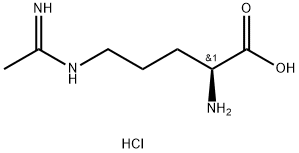N5-(1-Iminoethyl)-L-ornithine Dihydrochloride is an inhibitor of nitric oxide synthase (NOS), an enzyme that catalyzes the conversion of L-arginine to L-citrulline and nitric oxide. It also improves cardiac function and microcirculation. N5-(1-Iminoethyl)-L-ornithine Dihydrochloride inhibits inducible NOS (iNOS). These enzymes play critical roles in a wide array of physiological and pathophysiological conditions such as blood pressure regulation, inflammation, and infection.
Cell permeable. Approximately five times more potent as an inhibitor of endothelial nitric oxide synthase (IC50 = 500 nM) than other arginine analogs, such as L-NAME (Cat. No. 483125) and L-NMMA (Cat. No. 475886). Inhibits acetylcholine induced relaxation of rat aorta rings (IC50 = 2 μM) and causes a dose-dependent increase in mean arterial blood pressure in the rat (EC50 = 19.5 mg/kg).
l-nio dihydrochloride is an inhibitor of nitric oxide (no) synthase (inos, enos and nnos). an no synthase is inducible by immunological stimuli such as endotoxin (lps) and various cytokines, generating nitric oxide (no) in phagocytic cells including neutrophils and macrophages. generation of no by macrophages has been revealed to kill tumour cells due to the inactivation of ironsulphur centres of mitochondrial enzymes.
to protect against inflammatory injury stimulated by activated neutrophils, the ability of l-arginine (n-iminoethyl-l-ornithine (l-nio) was studied in rats, following intradermal or intrapulmonary deposition of immune complexes [1]. the protective effect of l-nio in the skin was reversed in a dose-dependent manner by the presence of l-arginine, rather than by d-arginine. the protective effects of l-nio l-arginine were reversed also in immune complex-induced lung injury, and not associated with reductions in neutrophil accumulation as measured by extraction from tissues of myeloperoxidase. the results demonstrate immune complex induced vascular injury induced by activated macrophage was inhibited effectively by l-nio as a potent inhibitor [1].
a dose-dependent increase in mean systemic arterial blood pressure accompanied by bradycardia was induced at the administration of l-nio (0.03-300 mgkg-1, i.v.). l-nio (100 mgkg-, i.v.) has an effect inhibitor of the hypotensive responses to ach and bradykinin. l-arginine (30-100 mg kg- 1, i.v.) in a dose-dependent manner reversed the increase in blood pressure and bradycardia produced by these compounds. it was enantiomer specific for all of these effects. these facts indicate that l-nio can inhibit no synthase as inhibitors in the vascular endothelium and verify that l-nio plays an important role for no synthesis in the maintenance of vascular tone and blood pressure [2].
[1]. mulligan ms, moncada s, ward pa. protective effects of inhibitors of nitric oxide synthase in immune complex-induced vasculitis. br j pharmacol. 1992 dec;107(4):1159-62.
[2]. rees dd, palmer rm, schulz r, hodson hf, moncada s.br j pharmacol. characterization of three inhibitors of endothelial nitric oxide synthase in vitro and in vivo.1990 nov;101 (3):746-52.
